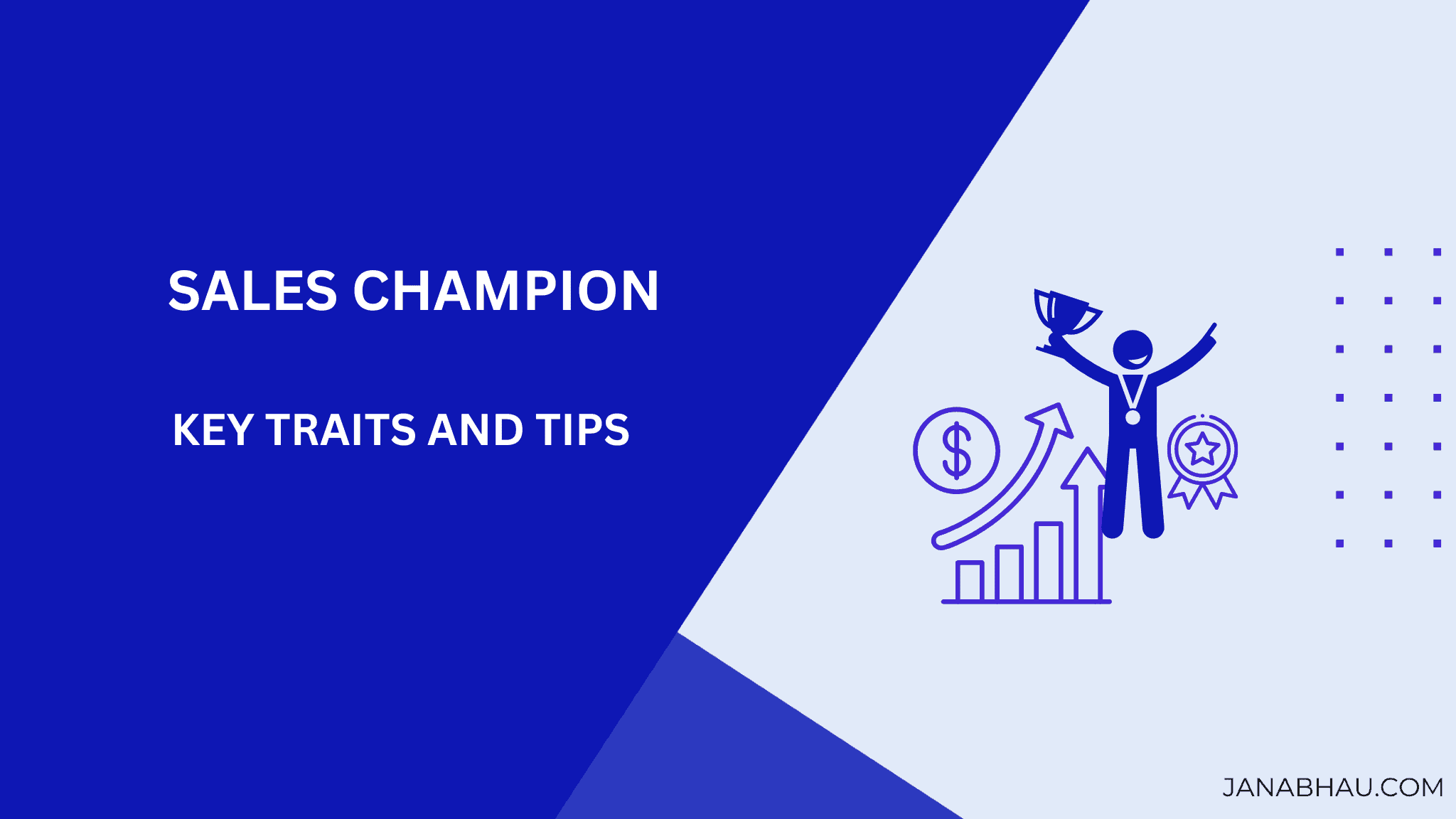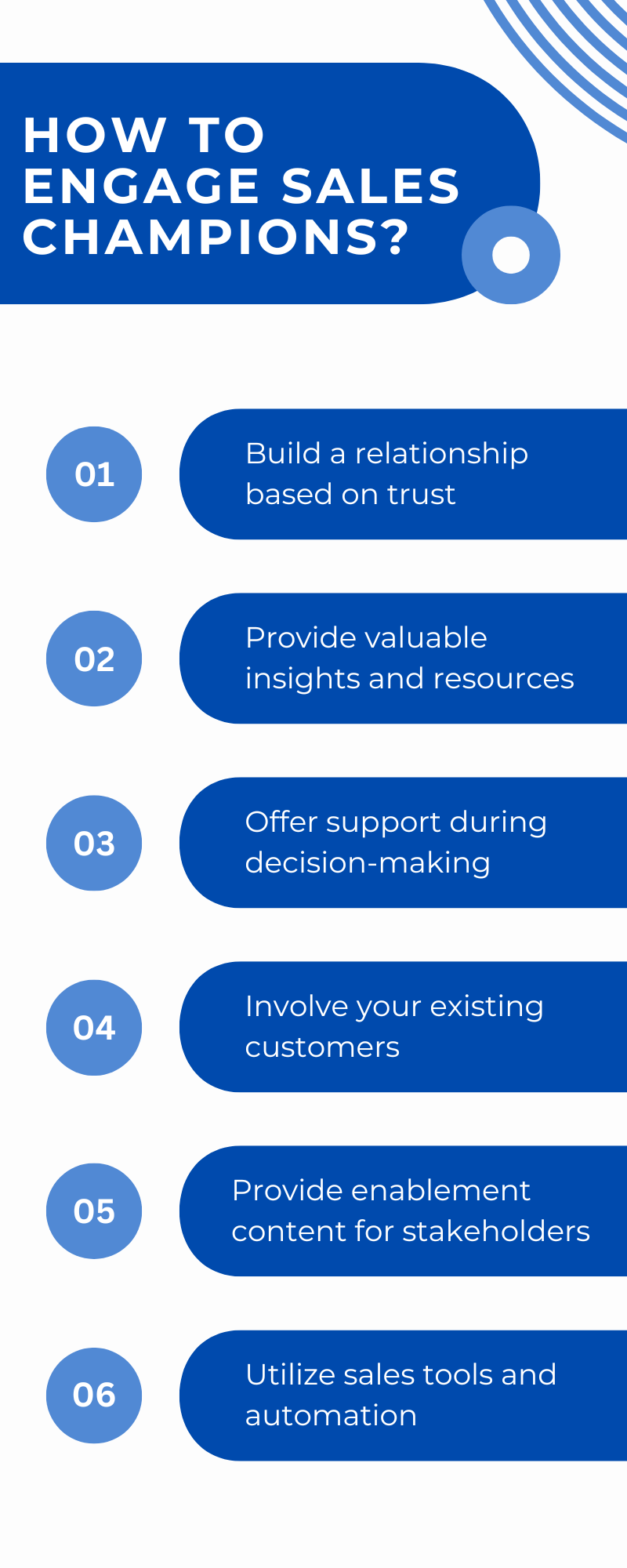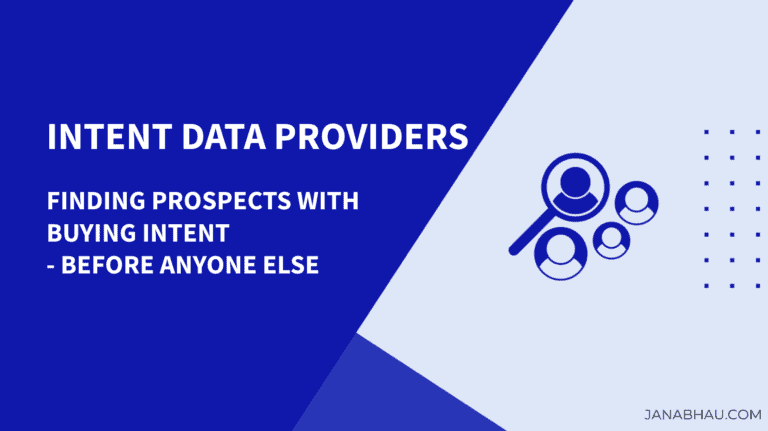Who are Sales Champions? [Key Traits and Tips for Effective Collaboration]

Are you finding it challenging to identify and collaborate with the right individuals who can drive sales success in your organization?
Working on hundreds of deals, I found out how critical sales champions are. They have the ability to make or break any deal.
Once I learned how to recognize the key traits of a sales champion and foster collaboration with them, my sales performance improved dramatically.
In this blog post, I’ll discuss how you can do the same for your organization.
Key takeaways
- Sales champions are key internal advocates who influence buying decisions and help navigate complex B2B sales processes.
- Essential traits of effective sales champions include influence and intel in their organization and joint incentives.
- Building trust and providing valuable resources enhance collaboration with sales champions, enabling them to advocate for your product/service successfully.
What is a sales champion?

A sales champion is an individual within the buyer company who recognizes the value of your service or solution. This person may be directly or indirectly involved in the buying decision but has the authority to convince key decision-makers.
It’s not that they just like your product, they actively promote and advocate for your solution within their organization.
A sales champion is the ally you need to speed up the sales process. Their influence and ability to steer internal decision-making make them indispensable to the sales team!
It’s important to identify your sales champion and build a rapport with them. With their insights into their organization’s requirements and willingness to adopt your solution, the chances of winning a sale multiply.
A sales champion can also help you maintain customer relationships and increase customer lifetime value, even after the sale is completed.
During the implementation and adoption process, sales champions handle objections and provide critical feedback that helps you speed up the processes for your customers. In essence, a sales champion helps smooth the path to a successful sale and long-term customer satisfaction.
Why are sales champions important in B2B sales?
Technically, you can sell your service without a sales champion, but the sales cycle will be long, the chances of losing out to the competition are higher, and it’s like navigating a maze without a map.
With a sales champion on your side, you have better insights into how the organization works, and you can sell to them effectively.
Here’s how a sales champion simplifies the sales process for you:
During the sales process
- Personalize sales offerings
Sales champions can help salesperson understand their organization’s unique needs and pain points. With this insight, you know which use cases, plans, or solutions to pitch to the business.
- Handle initial objections
They play a key role in building trust, developing compelling business cases, and addressing internal objections that might derail a deal. Their deep understanding of internal decision-making dynamics and ability to validate your strategies help you close deals faster.
- Identify and beat competitors
The sales champion is a part of the decision-making process. They generally know which of your competitors are being considered or evaluated against your service. As a sales rep, you can leverage this information to curate buyer enablement resources such as comparison decks, or pitch your product’s USPs at your next interaction.
- Share critical metrics from their organization
Sales champions also assist by sharing internal KPIs and introducing other key decision-makers who might benefit from your solution. You can include this data in your presentations or resources to effectively demonstrate the ROI they can achieve by implementing your product/service.
After completing the sale
- Upsell and cross sell services
As a sales rep, you can set up monthly or quarterly meetings with a sales champion to assess how well your service is working out for their business. The feedback and details on product usage help you identify potential touchpoints to introduce a cross-sell/upsell campaign.
- Gain qualified referrals
Referred customers tend to spend 200% more than customers acquired by outreach! If the customer is happy with the product, you might have gained even more sales champions who believe in your business and will help you take it ahead. You can request them to refer you within their network, or if they are willing to, maybe even share a post on social media about their experience with your product.
What are key traits of a sales champion?
In this section, I will segment the key traits into three easy-to-identify factors:
- Influence
- Incentive
- Intent
Each of these factors plays a crucial role in their ability to drive the decision-making process and rally support within their organization.
Influence

Influence is perhaps the most critical trait of a successful sales champion. Their ability to shape the internal buying conversation, bring other stakeholders into the discussion, and drive change is what makes them so valuable.
Ideally, the sales champion has a good rapport with all the stakeholders and is trusted by them to make the best decision for the organization.
Incentive

A sales champion’s incentive is often tied directly to the deal’s success. They have a vested interest in seeing the solution implemented because it aligns with their personal or professional goals. This vested interest ensures they are motivated to push through obstacles and advocate passionately for the solution, making their support invaluable in the sales process.
For example, if a business is looking for a marketing automation tool then a senior marketer could be a potential sales champion since they belong to the team and will also benefit from its implementation.
This is exactly why a sales champion demonstrates buying signals and are generally excited to know more about your product.
Intel

Intel, or the internal knowledge that a sales champion possesses, is another key trait. Their deep understanding of their company and its processes allows them to provide specific details, timelines, and insights that are crucial for navigating the sales process.
This knowledge helps the salesperson tailor their approach and address any potential issues before they become obstacles. An ideal sales champion is resourceful, understands business challenges, and is good at providing insights related to the decision-making process.
While a sales champion can streamline the purchasing decision, they still need your help in navigating the various obstacles in the process. Even though they are invested in your product, you need to help your sales champion vouch for it and convince the various decision-makers in their team.
How to identify potential sales champions?
A sales champion is a key player in the MEDDIC (Metrics, Economic Buyer, Decision Criteria, Decision Process, Identify Pain, and Champion) sales process—a methodology designed to enhance sales effectiveness.
A sales champion is integral in facilitating and accelerating the sales journey. However, you won’t come across them easily if they don’t already have a project and come to you via your inbound channels.
Here are some strategies to build a network of potential sales champions:
- Attend Industry-Specific Events: Engage with professionals at conferences, trade shows, and seminars to identify potential advocates for your product.
- Build Genuine Relationships Within Your Existing Network: Leverage existing connections, offline and on LinkedIn, to discover individuals who could become leads and potential sales champions.
- Nurture Webinar Prospects: Use webinars to educate potential champions about your product and its benefits, fostering a deeper connection.
- Identify ICPs Who Have a Requirement for Your Business: Target Ideal Customer Profiles (ICPs) who have a pressing need for your solution and are likely to advocate for it.
Now, you’re a step closer to identifying champions! There are few crucial personality traits that make a champion stand apart from the other decision makers.
How to Engage and Enable Sales Champions Effectively?

Once you have a sales champion on board and happy to advocate for your product, you need to ensure that you keep them engaged and offer relevant resources to close the deal.
1. Build a relationship based on trust
First of all, your sales champion should be able to trust you and your product. It’s important for sales teams to continuously recognize and celebrate their contributions to foster a sense of ownership. You also need to understand their goals to align interests and ensure that both parties are working towards the same objectives.
Regular communication and support can strengthen the relationship with a sales champion, ensuring that they remain engaged and motivated.
2. Provide valuable insights and resources
A sales champion is excited about your product, but that doesn’t mean that they understand the ins and outs of it. Providing valuable insights and product-related resources is another critical aspect of engaging sales champions. A genuine love for the product and the sales process fosters confidence and expertise in sales champions.
Offering essential resources such as case studies, compliance documents, product demonstrations, and expert support can empower sales champions to advocate for the solution effectively. You can also offer to train the sales champion to ensure they can communicate the solution’s value to stakeholders.
3. Offer support throughout the decision-making process
Offer continuous support as your sales champions guide their organization through the evaluation and decision-making phases. This could involve providing timely information, addressing any queries or concerns that arise, and assisting with the preparation of presentations or internal reports.
Being proactive in this support can help keep the sales process on track and address any roadblocks. Frequent communication also keeps you aware of potential objections that may delay your sales process.
4. Involve your existing customers
Long-term relationships with a sales champion aren’t built in a day! They actually need to see some examples of how effective and helpful your platform is before they can advocate it. The best plan would be to let your potential champion meet your existing sales champion, i.e. your customers.
This can be done through organized calls, joint meetings, or even casual coffee chats. Make sure the conversation is focused on sharing positive experiences and benefits that are relevant to the sales champion’s organization.
Share specific success stories and examples that demonstrate how your product has solved problems or created value for other businesses.
5. Provide stakeholder-specific enablement content
In the later stage of the buying journey, the key decision maker may change or belong to a different team, or they could even be the CEO. Then, the resources that you shared before may not be as relevant.
For example, CFOs might be focused on ROI and cost savings, while IT managers are more concerned with technical specifications and integration.
You can even create a centralized hub or library where they can quickly find and download the materials they need. Developing content that speaks directly to these varied interests ensures that your sales champion has the right tools to address each stakeholder’s specific concerns.
6. Utilize sales tools and automation
To effectively engage sales champions using sales tools and automation, start by leveraging your CRM system to centralize and track information about your champions.
Utilize CRM features to set up automated updates about product news and developments, keeping your champions informed and ready to advocate.
You can even implement email automation to create personalized campaigns and drip sequences that provide tailored content, such as case studies or product updates, directly to your sales champion.
Sales enablement tools can help you build a centralized library of resources and on-demand training modules!
Conclusion and My Own Experience
In summary, a sales champion is an invaluable asset in the B2B sales process, offering influence, insights, and advocacy that can significantly impact the success of a sale.
Sales professionals can navigate complex sales cycles by identifying the right sales champion and providing them with the necessary support and resources.
For a long time, when qualifying sales opportunities, I primarily focused on company-specific criteria, challenges, and potential use cases.
However, my outcomes drastically improved once I started evaluating the key stakeholders I spoke with, determining whether they had the potential to be just okay or great champions for my product. By identifying the right individuals and then doing everything I could to enable them throughout their buying process, I achieved much better results.
Therefore, understanding what makes a sales champion and recognizing the difference between an okay and a great one can significantly impact your sales process and the effectiveness of sales techniques.
Frequently Asked Questions
Why are sales champions important in B2B sales?
Sales champions are crucial in B2B sales because they empower sales teams by steering internal meetings and influencing key decisions. Their support can significantly boost your chances of closing deals.
What traits should an effective sales champion exhibit?
An effective sales champion should definitely show strong influence and genuine interest, along with the authority to make key decisions. These traits can really drive success in sales.
How can a sales champion assist in the buying process?
A sales champion can really help you navigate the buying process by sharing important internal KPIs and connecting you with other key decision-makers. They also provide valuable training for the salesperson and help highlight how their solution stands out from the competition.
What is the difference between a sales champion and a sales coach?
A sales champion is an internal advocate within a customer’s organization who supports and promotes your product. In contrast, a sales coach is an expert who trains and supports a sales team to improve their skills and performance. Although they both improve your sales performance, their roles and responsibilities are vastly different.
What is the MEDDIC sales methodology?
The MEDDIC framework is a sales methodology that helps you gain a deeper understanding of your prospects by focusing on metrics, the economic buyer, decision criteria, the decision process, and the champion who can advocate for your solution. It’s an effective way to tailor your approach and increase your chances of closing deals.

![How Data Enrichment Transforms Sales & Marketing Activities [+Best Practice]](https://janabhau.com/wp-content/uploads/2024/02/Feature-Images-5-768x432.png)

![How to Craft an Effective Prospecting List in 2024 [+Template]](https://janabhau.com/wp-content/uploads/2024/04/Screenshot-2024-04-14-at-16.25.44-768x433.png)


